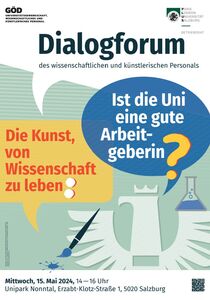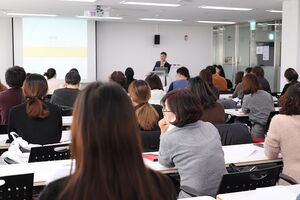BL13-News 03/24
Information by the University Union
The Federal Executive Board "Bundesleitung 13", BL13 for short, of the University Union which represents the academic and and artistic university staff wihtin the Public Service Union (GÖD) is pleased to provide you with the following in a new issue of the newsletter:
- A summary of the third edition of the Dialogue Forum on May 15, 2024, in Salzburg
- the positions of Austrian parties on key university policy issues
- the announcement by the Minister of Science to demand maximum fixed-term quotas for academic staff
- comments on teaching categories, developed as part of a union training event
- announcement of an event by the Regional Executive Board of Upper Austria on "Fixed Term Contracts and the Labor Law" at the JKU Linz on 14th November 2024
We look forward to your feedback via e-mail to redaktion.bl13@goed.at!
The Art of Making a Living in Academia: Are Universities Good Employers
A summary from May 15th 2024

The 2024 Dialogue Forum was dedicated to a very wide-ranging topic. The contributions to the discussion reflected this.
Two keynote speeches by colleagues from the Paris Lodron University of Salzburg (PLUS) provided insights into the HR policy at the PLUS and thus laid the foundation for discussing general problems in the implementation of a more attractive HR policy.
The problem in the postdoc area, that so few positions with prospects are offered, was a fundamental subject. Irmtraud Kaiser presented the “solution approach” that the PLUS has been pursuing here for several years. She showed that this PLUS approach also has negative effects on motivation and loyalty to the university as an institution. Those affected emphasize that this model does not fulfill the goal of a performance-related evaluation with the associated financial and labor law consequences.
A second problem field is the work situation of senior lecturers. Ulrike Burgstaller, Andreas Paschon and Benjamin Wright carried out a comprehensive study on this at the PLUS in spring. The findings are disillusioning: it turns out that many colleagues are highly committed and fully dedicated to their work, but that they suffer from a lack of flexibility and an excessive teaching load without any real compensation prospects. The salaries are far below the remuneration of AHS teachers.
The subsequent discussion highlighted similarities with other locations and that this is therefore not just a local problem. The problem of massively limited career prospects for postdocs is therefore a general, Austria-wide problem - in the same way as making employment as senior lecturers more attractive, who make key contributions to teaching at many locations.
Finally, another hot issue was discussed: Collegial co-determination and its expansion, particularly in areas relevant to staff. This was outlined in a concise presentation by Stefan Schön; Stefan Schön is Deputy Chairman of the Federal Executive Board 13.
Career prospects, making jobs at universities more attractive, commitment to performance-related remuneration and a sufficient degree of co-determination - all of these issues were not only discussed in the dialog forum, but were also seen by the participants as key relevant factors for universities to become good employers. The findings discussed show that we still have a long way to go here, which will require a lot of constructive dialog.
Election compass for university politics
Netzwerk Unterbau Wissenschaft

September 29th is approaching!
Election and party manifestos are vague to ambiguous when it comes to higher education policy issues. For this very reason, the Netzwerk Unterbau Wissenschaft, or NUWiss for short, asked the parties running for election throughout Austria about their higher education policy positions.
A questionnaire was distributed to those responsible for the lists in mid-August. There was feedback from all of them, some longer, some shorter. The results were carefully evaluated by an editorial team, the assessments were cross-checked with the parties and summarized in a grid. NUWiss makes the full texts and the summary available to everyone: “Wahlkabine Universitätspolitik”: Fragen und Antworten zur Zukunft der österreichischen Universitäten - Netzwerk Unterbau Wissenschaft (nuwiss.at)
The feedback has brought to light some surprising but also unexpected things and has shed new light on many a “movement”.
All parties are unanimous in their commitment to public universities. They disagree in detail on the definition of the public mission. They are committed to the principle of research-led teaching and reject a decoupling of research and teaching, whereby some have particularly emphasized forms of employment such as senior lecturers with a focus on teaching. (Editor's note: This also means that the “exploitation” of cheap university lecturers for “exclusively teaching”, as is the case at some universities, is not considered a good thing, because then no real research by these people can take place).
There is no explicit opposition to basic university funding, but only a few of the parties present concrete proposals.
Performance indicators and the significance of rankings are controversially discussed.
University autonomy as well as participation and control are considered appropriate and sufficient. Some call for fundamental changes, such as the abolition of the curia system. Clear and transparent career options and the improvement of working conditions is a common consensus. However, assessments of the urgency and nature of changes in HR policy differ. Some parties are very critical of fixed-term contracts and limited opportunities for transfer and promotion, while others do not want to intervene too much and see this as a central management task of the rectorates.
On the basis of these assessments and the blurred contours that result on some topics, it remains essential to remain in discussion with all parties. We will continue the dialog on the central issues now and especially after the election.
Outlook on the performance agreements
BM Polaschek announces more permanent positions for Pos-Docs

At the end of August 2024, Federal Minister Polaschek made an exciting announcement to encourage more permanent positions for postdocs: Unis – Polaschek kündigt mehr unbefristete Stellen für Postdocs an (apa.at).
As a trade union for the public sector, the federal executive board for academic and artistic staff, we are delighted with this initiative, as evidence-based research shows that there is a massive need for action in the postdoc sector in particular. We have been communicating proposals for improvements for a long time. However, a closer look reveals that this initiative is limited to third-party funded positions and that globally funded positions remain neglected.
From the point of view of the Federal Representation, it was and is inconclusive that people who have successfully acquired third-party funding several times and thus financed themselves, were repeatedly only employed once or even several times only on a temporary basis. Individual universities used the amendment to §109 UG to make these employees permanent. BOKU was cited as a positive example of this, but in the same breath was excluded from the planned job expansion, as it had already reached the 25% indicator. Other locations are also excluded from this initiative. The reasons for this are not clear to us.
It is undisputed that some university administrations need impetus to change their position on permanent postdoctoral positions. Taking up the option of changing the culture via a performance agreement is an interesting move.
The announced 450 permanent positions are an important first step in this regard. We are currently researching in detail how the selection of universities and the criteria used are to be understood. The information published to date does not provide this. For an assessment of this “measure”, it would also be important to know how proof is provided and what consequences are “threatened” in the event of non-compliance.
It remains to be seen whether and how the universities will react to this and which specific regulations will then be included in the individual performance agreements at the end of the year.
As a follow-up, we would also like to refer you to a statement published at the end of August by the Austria-wide network NUWiss: http://uni-wien-unterbau.at/wp-content/uploads/2024/08/Presseaussendung_Unbefristete-Stellen_29.8.2024.pdf
Dealing with teaching categories
Interesting interpretations of the collective agreement

Research-led and art-led teaching necessarily generates different types of lectures.
These are mapped in a wide variety of teaching categories, which subsequently result in different remuneration, often not comprehensible to many. Teaching categorization is also provided for in the collective agreement. This is justified by the fact that it can be differentiated according to the work involved in the course.
Due to recurring problems with the interpretation of the specified regulations, the Federal Executive Board invited Professor Walter Pfeil in May 2024 to take a closer look at this problem area in an in-depth presentation.
References to a local event
Lunch Lecture “Chain contracts and the labor law”

Lunch Lecture with Walter Pfeil on the topic of chain contracts and labor law at the JKU Linz on Thursday, November 14, 2024 at 12 noon.
The event is organized by GÖD Landesleitung 13 Oberösterreich (the Regional Executive Board 13 Upper Austria) and the NuWiss Unterbau Linz in cooperation with the BRwiss of the JKU and BRwkP of the Kunstuniversität Linz.
Lunch packages will be distributed at the beginning of the event.
Walter Pfeil is professor emeritus for labor and social law at the University of Salzburg. He is a profound expert on the Universities Act and the University-collective agreement. In his lecture, he will take a tour through the UG and the KV and deal with the chain contract regulation as well as, for example, working time regulations.
Finally, there will be an opportunity to discuss further labor law issues with the audience.
Date: Thu, 14.11.2024
Time: from 12:00 to 13:30
Location: JKU Linz, lecture hall 3 Kepler building